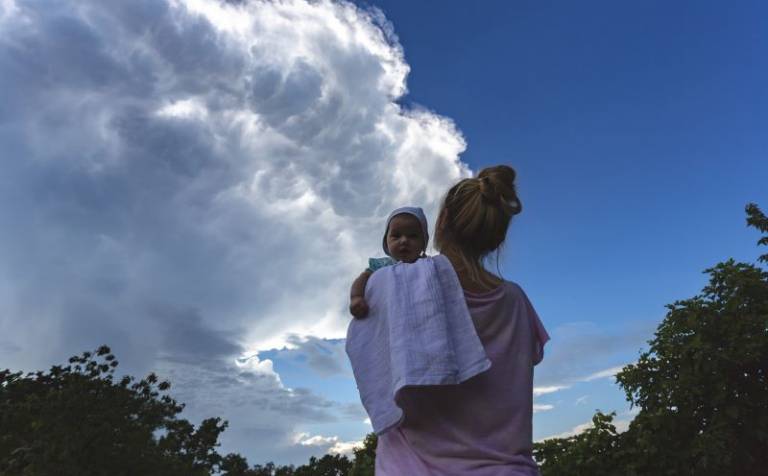Ethical, environmental and political concerns about climate change affect reproductive choices
10 November 2023
People are beginning to reconsider their reproductive decisions due to complex concerns about climate change, with many choosing to forego childbearing, or reduce the number of children they have as a result, finds a new study by UCL researchers.

The research, published in PLOS Climate, is the first systematic review to explore how and why climate change-related concerns may be impacting reproductive decision-making.
The team examined 13 studies, involving 10,788 participants, which were conducted between 2012 and 2022, primarily in Global North countries such as the USA, Canada, New Zealand, and various European countries. They found that climate change concerns were typically associated with less positive attitudes towards reproduction and a desire or intent for fewer children or none at all.
Underpinning this finding were four key factors: uncertainty about the future of an unborn child, environmentalist views centred on overpopulation and overconsumption, meeting family subsistence needs, and political sentiments.
The term eco-anxiety has rapidly entered public discourse, describing a range of negative emotional responses including fear, worry, guilt and anger as a response to climate change. In 2018, a nationally representative New York Times survey found that 33% of childfree Americans aged 20-45 cited being “worried about climate change” as a reason for not having children.
Since then, ethical concerns about the quality of life children might have in a climate-changed future have been cited as the primary rationale for individuals choosing to not have children. However, the team behind this new study wanted to understand if there was an evidence base supporting the claims that climate change concerns were causing people to change their childbearing decisions, and if so, whether any other motivating factors, aside from ethical concerns, came into play.
The new analysis found that in 12 out of 13 studies, stronger concerns about climate change were associated with a desire for fewer children, or none at all.
One of the main reasons for this was the individual’s concern for their children in a world affected by climate change. However, the review also highlighted three other factors, with a primary concern being the ecological impact of reproduction, as people feared that having children would contribute to overpopulation and overconsumption in a world with already stretched resources.
To a lesser extent, two studies in Zambia and Ethiopia also found that participants desired fewer children to meet subsistence needs during periods of declining agricultural productivity.
Finally, individuals in another study had political considerations resulting in their decision to not have children – with two participants even reporting their refusal to have children as a method of ‘striking’ until systemic change was enacted.
Interestingly, these final two themes were also raised by some participants as reasons to have a greater number of children. For example, in Zambia, participants were concerned about their ability to support their family without the household labour provided by additional children helping with domestic work, as well as water and food collection.
Lead author, Hope Dillarstone (former MSc student at the UCL Institute for Global Health), said: “Recent media attention has been paid to a growing number of individuals factoring their concerns about climate change into their childbearing plans. However, we were concerned that public discourse may have oversimplified this relationship.
“Our first-of-its-kind study shows that there is a complex and intricate relationship between climate change and reproductive choices, with differences noted both within and between countries across the world.
“Our analysis shows that not only are many people concerned about their child’s welfare growing up in a world of uncertainty, but that they are also considering the impact of having children on the environment, their family’s ability to subsist, and their politics.
“Understanding why some people choose to adjust their reproductive decisions as a result of climate change may prove instrumental for shaping public policy, showing a need for collaboration among policymakers to incorporate local-level environmental concerns within national and international climate change, mental health and sexual and reproductive health policies.”
The team are now calling for more research at the intersection of climate change, mental health, and reproductive decision-making, particularly among highly affected Global South populations where current research is lacking.
Links
- Research in PLOS Climate
- Dr Laura J Brown's academic profile
- UCL Institute for Global Health
- UCL Population Health Sciences
Image
- Jurkos on iStock
Media contact
Poppy Danby
E: p.danby [at] ucl.ac.uk
 Close
Close

